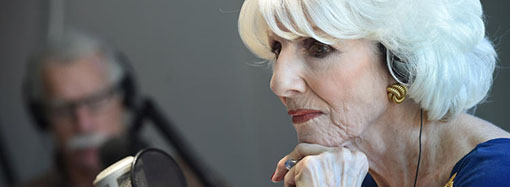The show features discussions with newsmakers in the first hour and interviews with authors and artists in the second.
Diane Rehm, the host of one of public radio's longest-running and most popular news discussion programs, will retire next year, ending nearly 40 years on the air.
A retirement date has not been firmly established, but Rehm, who is 79, says she will end her eponymous program, produced by Washington public station WAMU-FM (88.5), after the presidential election in November.
"My thinking is that I'll stay on the air until the election because I really want to see how this will go," Rehm said in an interview Tuesday. "My feeling is, I have a number of ideas and I'm perfectly happy doing something different . . . where I'm not forced to get up at 5 a.m. every morning to prepare for a show. I've been doing that for 37 years. Maybe I'll get to sleep until 7 or 7:30 a.m., like other people do."
"The Diane Rehm Show" has been one of the staples of news-oriented public-radio stations nationwide for the past two decades. The two-hour program is carried on 197 stations and attracts an audience of about 2.5 million weekly.
The show features discussions with newsmakers in the first hour and interviews with authors and artists in the second. Rehm has often been praised for maintaining a civil tone and a nonpartisan orientation in a medium that has grown increasingly shrill and polarized over the past two decades.
Rehm has been in discussions with WAMU management about her future for the past several months. The station would like her to continue, but it has begun preparing for her departure. During her periodic absences - Rehm receives treatment three times a year for a voice condition called spasmodic dysphonia - the station has used guest hosts who are being considered to succeed her.
Among others, these have included Melissa Block, a former co-host of NPR's "All Things Considered"; and Indira Lakshmanan, a guest host of "Here and Now," another NPR newsmagazine program. Melissa Ross, the host of a Jacksonville, Florida, public-radio program, will substitute for Rehm later this week.
"I really love what I do, but I know it can't go on forever," Rehm said. "Fortunately, I'm a young 79, if you can believe it. People say, 'How can you walk so strongly? How can you wear high heels?' Because I'm one of the lucky ones."
Rehm will be away from the microphone for about a month and a half early next year. In mid-January, she will travel to Portland, Ore., for a scheduled voice treatment that will keep her off the air for about two weeks. Immediately afterward, she will begin a month-long tour to promote a new memoir, "On My Own," about the year since the death of her husband, John, a former State Department official, and about the "right to die" or assisted-suicide movement, of which she is an advocate.
A former secretary and stay-at-home mother who never attended college, Rehm first joined WAMU as a volunteer in 1973, booking guests for a program called "The Home Show." She became the host of the station's morning talk show, "Kaleidoscope," in 1979. The show was renamed "The Diane Rehm Show" in 1984. It went into national syndication via NPR in 1995 after Rehm helped raise the money for distribution.
"I never thought I'd have a career of any kind, much less a career in radio," she once said.
Over the decades, Rehm has interviewed many of the nation's leading political figures, including Presidents Carter, Clinton and Obama, and such cultural luminaries as Toni Morrison and Fred Rogers of "Mister Rogers' Neighborhood."
Rehm has discussed staying with the station in some capacity after retiring from broadcasting. Among the options discussed are a role in fundraising and a speaker series, in which she would interview a panel or an important guest before an audience.
Rehm said the death of her husband of 54 years last year as a result of complications from Parkinson's disease made her reconsider her future. Among other things, she wants to advocate on behalf of aid in dying for the terminally ill, a cause she has been obliged to avoid espousing on the air. "John so wanted to die on his own terms," she said. "It made me feel like I had to speak out for the right to die."
She called the decision to end her program "a very positive bit of news that delights me. . . . I feel so fortunate. I feel as if I'm in control of my own life not only now, but going forward."








